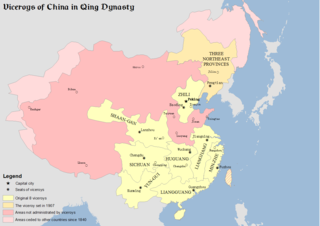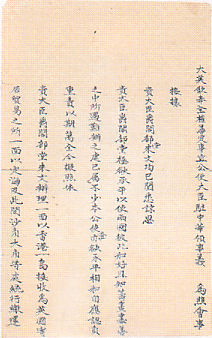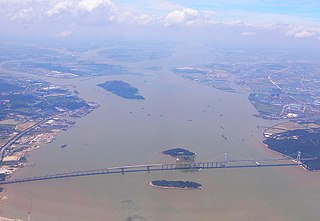| |||||
| Decades: | |||||
|---|---|---|---|---|---|
| See also: | Other events of 1841 History of China • Timeline • Years | ||||
Events from the year 1841 in China .
| |||||
| Decades: | |||||
|---|---|---|---|---|---|
| See also: | Other events of 1841 History of China • Timeline • Years | ||||
Events from the year 1841 in China .

The First Opium War, also known as the Opium War or the Anglo-Sino War was a series of military engagements fought between Britain and the Qing dynasty of China between 1839 and 1842. The immediate issue was the Chinese enforcement of their ban on the opium trade by seizing private opium stocks from merchants at Canton and threatening to impose the death penalty for future offenders. Despite the opium ban, the British government supported the merchants' demand for compensation for seized goods, and insisted on the principles of free trade and equal diplomatic recognition with China. Opium was Britain's single most profitable commodity trade of the 19th century. After months of tensions between the two nations, the British navy launched an expedition in June 1840, which ultimately defeated the Chinese using technologically superior ships and weapons by August 1842. The British then imposed the Treaty of Nanking, which forced China to increase foreign trade, give compensation, and cede Hong Kong to the British. Consequently the opium trade continued in China. Twentieth century nationalists consider 1839 the start of a century of humiliation, and many historians consider it the beginning of modern Chinese history.

Lin Zexu, courtesy name Yuanfu, was a Chinese political philosopher and politician. He was the head of states (Viceroy), Governor General, scholar-official, and under the Daoguang Emperor of the Qing dynasty best known for his role in the First Opium War of 1839–42. He was from Fuzhou, Fujian Province. Lin's forceful opposition to the opium trade was a primary catalyst for the First Opium War. He is praised for his constant position on the "moral high ground" in his fight, but he is also blamed for a rigid approach which failed to account for the domestic and international complexities of the problem. The Emperor endorsed the hardline policies and anti-drugs movement advocated by Lin, but placed all responsibility for the resulting disastrous Opium War onto Lin.

Zongdu, usually translated as Viceroy, Head of State or Governor-General, governed one territory or more provinces of China during the Ming and Qing dynasties.

The Convention of Chuenpi was a tentative agreement between British Plenipotentiary Charles Elliot and Chinese Imperial Commissioner Qishan during the First Opium War between the United Kingdom and the Qing dynasty of China. The terms were published on 20 January 1841, but both governments rejected them and dismissed Elliot and Qishan, respectively, from their positions. Foreign Secretary Lord Palmerston stated that Elliot acquired too little while the Daoguang Emperor believed Qishan conceded too much. Palmerston appointed Major-General Henry Pottinger to replace Elliot, while the emperor appointed Yang Fang to replace Qishan, along with Yishan as General-in-Chief of Repressing Rebellion and Longwen as an assistant regional commander. Although the convention was unratified, many of the terms were later included in the Treaty of Nanking (1842).
Qishan, courtesy name Jing'an, was a Mongol nobleman and official of the late Qing dynasty. He was of Khalkha Mongol and Borjigit descent, and his family was under the Plain Yellow Banner of the Manchu Eight Banners. He is best known for negotiating the Convention of Chuanbi on behalf of the Qing government with the British during the First Opium War of 1839–42.
Yishan, courtesy name Jingxuan, was a Manchu lesser noble and official of the Qing dynasty. He is best known for his failure to defend Guangzhou (Canton) from British forces during the First Opium War, and for signing the treaties of Kulja and Aigun with the Russian Empire in 1851 and 1858 respectively.

The Humen, also Bocca Tigris or Bogue, is a narrow strait in the Pearl River Delta that separates Shiziyang in the north and Lingdingyang in the south near Humen Town in China's Guangdong Province. It is the site of the Pearl River's discharge into the South China Sea. It contains the Port of Humen at Humen Town. The strait is formed by the islands of Chuenpi and Anunghoy on the eastern side, and Taikoktow on the western side. Since 1997, the strait has been traversed by the Humen Pearl River Bridge. Bocca Tigris was the entry to China's only trading city, Kanton.

The First Battle of Chuenpi was a naval engagement fought between British and Chinese ships at the entrance of the Humen strait (Bogue), Guangdong province, China, on 3 November 1839 during the First Opium War. The battle began when the British frigates HMS Hyacinth and HMS Volage opened fire on Chinese ships they perceived as being hostile.

The Second Battle of Chuenpi was fought between British and Chinese forces in the Pearl River Delta, Guangdong province, China, on 7 January 1841 during the First Opium War. The British launched an amphibious attack at the Humen strait (Bogue), capturing the forts on the islands of Chuenpi and Taikoktow. Subsequent negotiations between British Plenipotentiary Charles Elliot and Chinese Imperial Commissioner Qishan resulted in the Convention of Chuenpi on 20 January. As one of the terms of the agreement, Elliot announced the cession of Hong Kong Island to the British Empire, after which the British took formal possession of the island on 26 January.

The Battle of the Bogue was fought between British and Chinese forces in the Pearl River Delta, Guangdong province, China, on 23–26 February 1841 during the First Opium War. The British launched an amphibious attack at the Humen strait (Bogue), capturing the forts on the islands of Anunghoy and North Wangtong. This allowed the fleet to proceed further up the Pearl River towards the city of Canton (Guangzhou), which they captured the following month.

Guan Tianpei was a Chinese admiral of the Qing dynasty who served in the First Opium War. His Chinese title was "Commander-in-Chief of Naval Forces". In 1838, he established courteous relations with British Rear-Admiral Frederick Maitland. Guan fought in the First Battle of Chuenpi (1839), the Second Battle of Chuenpi (1841), and the Battle of the Bogue (1841). The British account described his death in the Anunghoy forts during the Battle of the Bogue on 26 February 1841 as follows:
Among these [Chinese officers], the most distinguished and lamented was poor old Admiral Kwan, whose death excited much sympathy throughout the force; he fell by a bayonet wound in his breast, as he was meeting his enemy at the gate of Anunghoy, yielding up his brave spirit willingly to a soldier's death, when his life could only be preserved with the certainty of degradation. He was altogether a fine specimen of a gallant soldier, unwilling to yield when summoned to surrender because to yield would imply treason.

The Commander-in-Chief, East Indies and China was a formation of the Royal Navy from 1831 to 1865. Its naval area of responsibility was the Indian Ocean and the coasts of China and its navigable rivers.

The First Battle of Canton was fought between British and Chinese forces in Canton, Guangdong Province, China, on 18 March 1841 during the First Opium War. The capture led to the hoisting of the Union Jack on the British factory in Canton and the resumption of trade between the British and the Chinese.
Yang Fang (1770–1846) was a Han Chinese general and diplomat during the Qing dynasty (1644–1911). Born in Songtao, Guizhou Province, he joined the military as a young man and became a secretary, where he came to the attention of General Yang Yuchun, who recommended him for military school.
Lu Kun, was a Chinese politician of the Qing dynasty. He was a student of politician and scholar Ruan Yuan. He was born in Zhuozhou Prefecture, Shuntian Fu (顺天府).

The destruction of opium at Humen began on 3 June 1839 and involved the destruction of 1,000 long tons of illegal opium seized from British traders under the aegis of Lin Zexu, an Imperial Commissioner of Qing China. Conducted on the banks of the Pearl River outside Humen Town, Dongguan, China, the action provided casus belli for Great Britain to declare war on Qing China. What followed is now known as the First Opium War (1839–1842), a conflict that initiated China's opening for trade with foreign nations under a series of treaties with the western powers.
Royal Saxon was a British merchant ship built at Liverpool in 1829. She carried cargo and passengers to India, Australia, and the Far East. In 1839 Royal Saxon attempted to violate a Royal Navy blockade of Canton and inadvertently became the direct cause of the Battle of Chuenpi and consequently the First Opium War. She is last listed in Lloyd's Register in 1857.
Events from the year 1850 in China.
Events from the year 1842 in China.
Events from the year 1839 in China.